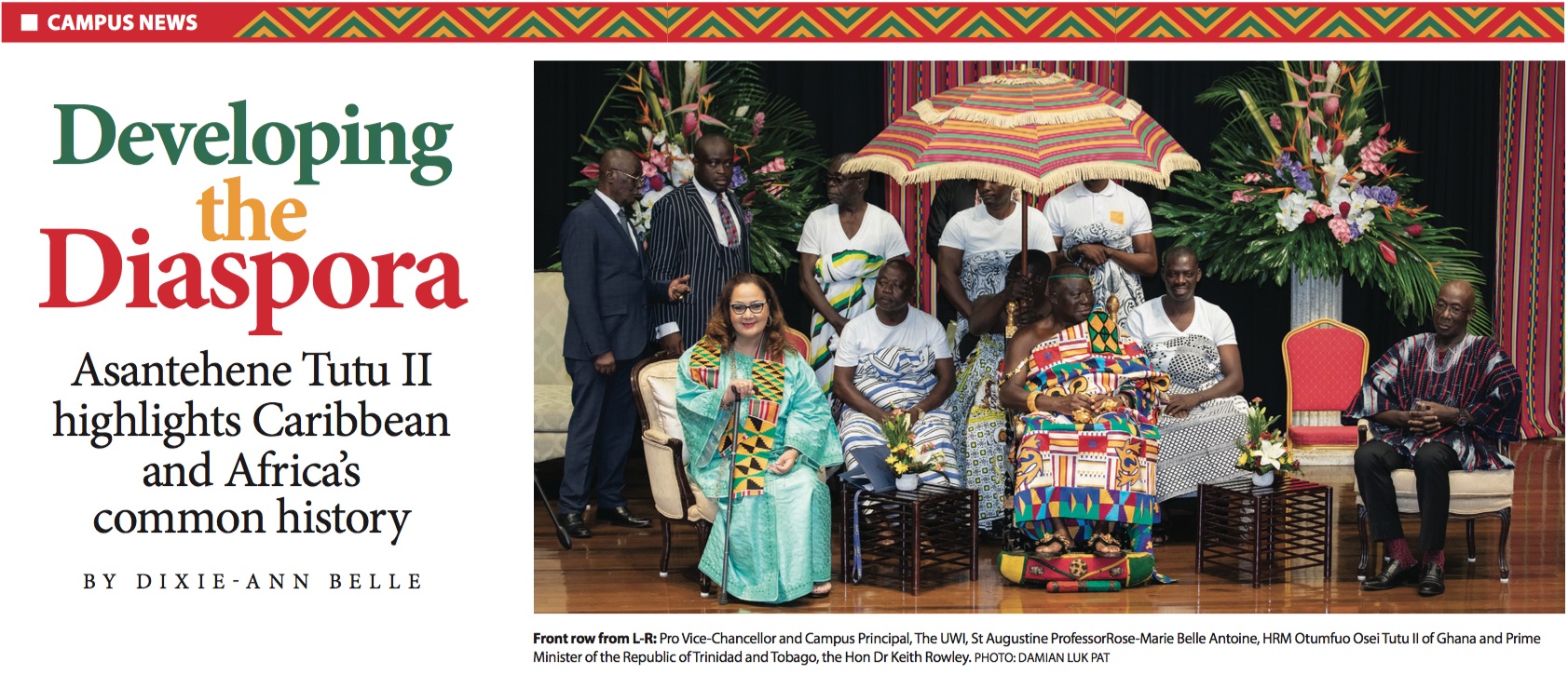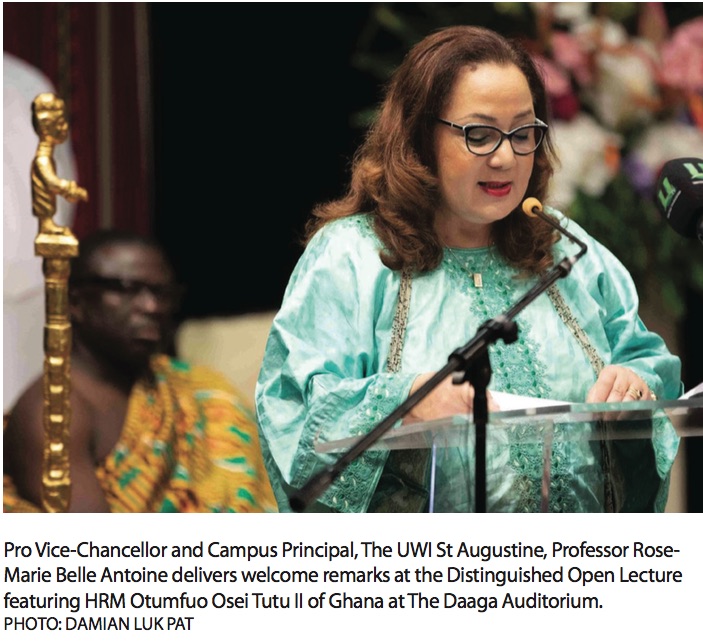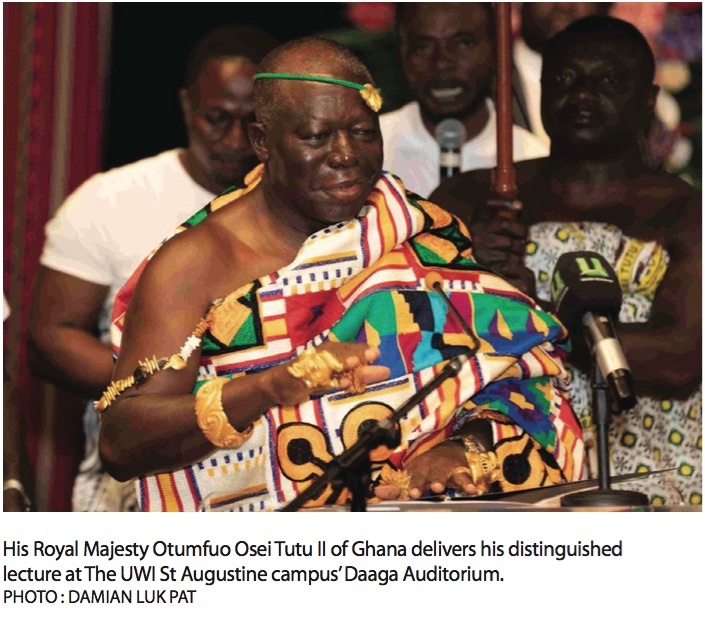
“I will argue that you cannot separate the conditions of Africa today from the conditions of the Caribbean, nor can you isolate the afflictions arising from the pervasive challenges of discrimination and racial inequality from the challenges confronted in Africa and the Caribbean islands.” .” These were the words of the Asantehene, His Royal Majesty (HRM) Otumfuo Osei Tutu II, expressing a desire for stronger connections between the diasporas of the Caribbean and Africa. His speech resonated with the audience during his address at this year’s Distinguished Open Lecture series at the Daaga Auditorium, UWI St Augustine campus in August. The packed event was also attended by the Prime Minister, the Dr the Honourable Keith Rowley and his wife, Sharon Rowley.
The UWI St Augustine Campus Principal, Prof Rose-Marie Belle Antoine expressed similar wishes in her welcome address. “It is time for us to reconnect with Africa,” she stated, “not just in our intellectual engagements, but as a nation and people - and it is not simply because of nostalgia or history.” She highlighted the need for scholars, intellectual leaders and policy makers to collaborate with African nations to develop beneficial partnerships and “to address the common challenges that we face in an increasingly perilous and unequal global space.”
Many in the audience wore African themed attire, and there was a spirited performance by the Asantehene’s dancers which further evoked a sense of cultural pride.
Despite the atmosphere of celebration, the king did not shy from speaking of some of the darker themes of colonialism that Caribbean and African countries have in common.

“All these afflictions have grown from the same root,” he asserted, adding, “we all have been bitten by the same virus and the consequence is the same wherever we may be.”
Emphasising the enduring scars of colonialism, the Asantehene likened the psychological effects to untreated post traumatic stress disorder (PTSD). “The failure of the post-emancipation experience to address the challenge of the mental and psychological liberation of the people from the combined effects of slavery and colonialism cannot be dismissed as a factor in the struggle.” He expounded on how history has often depicted warped views of African society and drew images of sophisticated, ancient African empires which boasted marvels of architecture and art and were advanced in writing, arithmetic, geometry, medicine and astrology. He observed that historians have often disregarded these significant details and chosen “to rather consign the African experience at best as an appendage to the story of European adventures and at worst as some subhuman evolution.” He maintained, “It is a travesty that does not have a place in our time.”
The Asantehene noted that even after emancipation, it was “the perpetrators who were compensated and not us.” He added, “The victims were left to themselves. Not only was no possibility of support available, but crucially, no consideration was ever given to the consequence of the centuries of trauma and suffering.”

In spite of this painful history, the Asantehene stressed the importance of continuing to push forward and advance beyond colonial influence. He affirmed that the African diaspora has risen and continues to rise above many obstacles. He held up Nelson Mandela and his own grand uncle who had both gone into exile in different circumstances and returned to their homes encouraging peace and reconciliation. Even in the midst of the struggles that persist post-emancipation, he stated, “it remains my view, ironically, that our experience shines a brighter light on the path to global peace”. Acknowledging his country’s relationship with the rest of the world, he added, “We have come to terms with the course of history, and better still, we are fortified in our belief that the courage to wage war is meaningless unless it is backed by the wisdom to make peace.”
Noting that unfair history should not hamstring the diaspora with regard to its past, he emphasised, “We should be capable of mastering the energy to repel the misconceptions of the past and build a better world for ourselves. The examples we have heard cited should inspire us to build inclusive societies where peoples of all races and religions share a common destiny.” Stressing the importance of taking pride in the diaspora’s rich heritage and unquenchable resilience, he added, “the Africa which is the cradle of mankind remains today the future of mankind”.

Principal Belle Antoine asserted the importance of UWI’s role in promoting African heritage for the benefit of all and commended Vice Chancellor Hilary Beckles as a leader in the movement for reparations for the descendants of enslaved Africans. She noted that steps were being taken to heal tangible, economic loss as well as intangible psychological ones. She also took the opportunity to ask assembled government officials to reinstate the mandatory study of history in schools.
“Emancipation must be more than a celebration or a fashion statement,” she declared. “It must be a revelation and a revolution.”